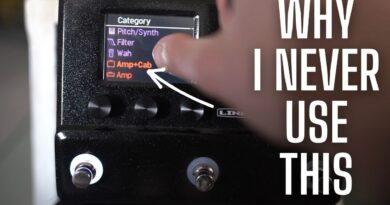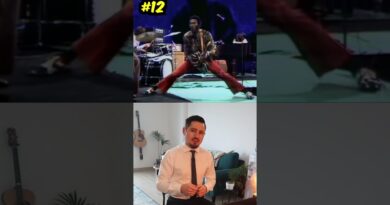The Future Of Guitar Amps
It’s hard to predict what the future will hold for the guitar amp. But there are definitely changes happening. Some believe that amp modellers will be the future, though I disagree. While I’m a fan of modellers, I personally see a bright future for the combo amp.
———————————————–
Social Media
https://www.instagram.com/kdhguitartv/
https://twitter.com/KDHguitarTV
Subscribe to support the channel 🙂
———————————————————–
Timestamps
0:00 Intro
0:40 The Combo
2:12 Marshall Stack
2:43 Lunchbox Amps
4:50 Amp modellers
6:02 FRFR
7:11 My Prediction
7:30 Volume
8:28 Sound
9:36 Weight
11:27 Looks
#Future #Guitar #Amps
Originally posted by UC9BJuXT406zELAfmEd7zh5w at https://www.youtube.com/watch?v=hBNRu3Jxr-g




I think for looks bands can also just have backdrops. Rush used things like vending machines and dryers onstage. I think getting creative with your stage setup is more interesting and fun than just a wall of cabinets
1×12 combo is the future? I’ve been using the future for like 30 years!
1×12 combo is the future? I’ve been using the future for like 30 years!
If you want to understand how the market is trending you need only look at the Line 6 cateloge. Powered cabs and multi-effects processors are they way things are going.
I think guitarists are some of the biggest fad/trend chasers around. I know a very vocal gigging guitarist who swore off Tube amps for modelers, only to recently do just the opposite and sell of his modeling amps to go back to a tube rig. My prediction, is similar to yours with the combo making a comeback, but i personally think a lower efficiency 1×10 makes more sense. The lower efficiency 10" speaker can gut a full frequency sound at lower volumes than most 12" speakers making it a legitimate bedroom level amp, while also sounding good while turned up and mic'd through a Pa. Currently i have a Joyo Bantamp MeteorII through a homemade closed back/ported baffle cab loaded with a Jensen c10r, and it is fully capable of going from bedroom to stage if you Mic it. I have a Roland Jazz chorus which i love for what it does, but it IS NOT a bedroom level amp. In a small room you better wear earplugs when playing the jc or you will sustain hearing damage. The only downsides i can find to the lunchbox amp, are the limited Eq controls on the amp, and lack of a reverb tank. Both issues can be remedied with pedals, but that means more pedals to pack, and frankly i prefer the sound of an true spring reverb over a digital emulation. But at the end of the day, you have to make compromises somewhere with your rig. add to that the fact that mosts guitarists are hobbyists and not performers. Occasionally you may play for friends and family, but most of us spend the most of our time playing for our own enjoyment. A simple self contained combo is the best all around option in that regard. And well i think software subscriptions services, from music players, to video games, to vehicles, and yes even to amp software has soured a lot of people on digital products, because in a lot of cases you don't actually "own" the product and you are potential 1 update away from owning an expensive paper weight. I'm not really a total troglodyte that is here to be anti digital, but many software licensing agreements are very anti consumer. I'd rather own analog kit that isn't beholden to the bean counting whims of some corporate bigwig that wants to squeeze more money out of something that's already been paid for.
I've felt this way about combos forever. I play bass and, apart from a year where I had an old Randal bass head into a 1×20, I've only used combos. The amp heads they're putting on Ampeg BA-210 and RB-210, Fender Rumble 500 and 800, or the Hartke 508, have the ability to DI and the Ampegs and Fenders can add cabs so you can stack them. If you need more volume than the stack, get a splitter and buy a second combo. It's all the same principles as building a cab these days.
My 120w 1×12 Peavey Vyper is everything I need… if i ever need more than 120w and 135dB, i can always mic it up…
My brain just designed a fresh product. – and that's what makes this new stuff exciting.
Honestly, in my humble experience of over 10 years of bar gigs, smaller and bigger venues, I'VE NEVER HEARD A PA MONITOR GIVING OUT A DECENT GUITAR SOUND. NEVER. No matter what the guitarist was using, cheap ass Zoom unit or a Kemper. Even miced up amps sound bad through them. There's really a fair argument for good old tube amps, despite all of their flaws. It was an eye opener for me when I cranked a 100watt Marshall tube heads. That sound and its details, are just, very very hard to replicate.
The important thing about modelers isn't only the weight. It's to recreate the album sound live on stage without 10 amps and 20 floor board effects. And: having the same sound every time, no matter the mic placement or speaker.
I've never stopped using a 20/40 watt combo amp or the 20/40 watt head and single 12" tone King cab / pre 2009. The issue with most big corporate amp builders is cheap builds that are way over priced. board mounted tube sockets and circuit boards that go conductive. in other words , land fill garbage. For a good build with enough transformers / iron to get the job done right you have to go outside the local music stores or the sweetwaters of the world. Cry once and you're finished.
Another change to consider is probably the NEED to move to solid state amps due to all the old amp techs retiring, pushing up the cost of repairs!
Very interesting. Thank you for sharing ❤
I'm seeing a new trend. People ditching their modelers for a tube amp.
Transport is indeed a hell of a problem, especialy when you be pushing 50. To my aged mind, the modellers are a great solution, espicially in the type of folk rock recordings I do, I get rid of the microphone in the chain, which is indeed a source of grief: you have to think of the quality and speicifications of the mic, the possibility of capturing unwanted sounds. I love that you can plug the modeller into the audio interface and then tweak the sound to your heart's desire.
I have to agree that combos are probably the way forward for most players. My dad’s band opened up for Jag Panzer in Europe. He has always rocked 100 watt heads and 4X12 cabs. Had to fly from California so he just took a slimmed down version of his pedal board, a guitar then simply used whatever the house had or whatever other local opening act had. His other guitar player uses a modeler. I have no clue what I’m talking about, but to my ears modelers tend to get squashed by a real amp. You still hear it, but something seems to be missing. Just my take.
I tried the modelers. I didn't like them. Digital modeling for live performance, you probably can't tell in a full mix the difference in tone. But you can never beat a tube amp. There is more dynamics sweeter overall tones that can't be duplicated digitally. If you can't hear the difference there is something wrong with your ears.
It's modelers. Don't overthink it.
Tubes and transformers are expensive. Analog solid state has been done, and still somewhat popular (Orange, Fender). Many venues don't allow or don't prefer live sound on stage, it's easier to DI than to mic a cab.
For everyone else, once you pay for the DSP to model tube breakup, you can add 100 other effects practically for free. The hardware isn't that expensive, and the algorithms are almost copy and paste from product line to product line (Helix models in HX Stomp, Pod Go, and Catalyst amps).
I have a Bad Cat Cub 40, Supro Blues King, Peavey Silver Stripe Bandit. All are 1×12 amps
Note I also have a Line 6 Power Cab FRFR for my AXFX AX8
Pronounce it correctly… MAY-suh Boogie. It's not Mess-uh. Nope. May-suh.
My first amp was a Lab Series L7 4×10 combo. It was a bear to carry around.
I think the lightest setup is a digital setup on a laptop and audio interface. hook up to the PA and everyone has an earpiece and a click track. You would have literally everything you need. Just open up a project with the tones you need maybe funnel a switcher to swap between distorted and clean tones. I'm a crazy or is this not possible?
Combo amp + XLR DI out w/included IR will be the way to go. With a modeler +FRFR speaker I still have a disconnect and don't get the feel of a real amp. I think there's room for both solutions though.
Evm12l god talking
Most guitar players can’t afford tube amps so solid state amps will save us
i'll stick with modlers and using in ear monitoring. but to be honest, currently i am not playing on stage that often, so its realy just for my case and for my band.
I had a Marshall 20w lead & bass in the mid/late 79s. Wasn't that a lunchbox?
When did guitarists become wimps? I'm a bass player. I take my stack. It just sounds better.
Glad you rock a Tiny Terror too!